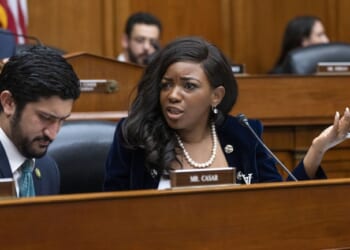
SEOUL, South Korea — South Korean President Yoon Suk Yeol is definitively out of office.
The impeachment of the conservative leader was upheld Friday, ending four months of intense, but almost entirely peaceful, political drama.
The country’s Constitutional Court judges, citing “negative effects on the constitutional order” and “grave violations of the law” unanimously ruled to uphold his impeachment, which followed his shock attempt to apply martial law on the night of Dec. 3 last year.
With Mr. Yoon out – and facing a questionable legal future – the country must hold a presidential election within 60 days.
Tens of thousands of anti-Yoon protesters who had gathered and crowded streets in the Seoul’s Anguk area, near the Constitutional Court, burst into cheers, danced, and waved signage and the national flag as the verdict was announced at 11:22 a.m. local time.
So heavy was online traffic that the country’s most popular app, Kakao, reportedly suffered temporary service problems.
The court’s decision ends an extraordinary political drama.
Mr. Yoon, whose agenda had been obstructed since parliamentary elections last spring handed the progressive Democratic Party of Korea (DPK) decisive control of the National Assembly, declared martial law on the night of Dec. 3.
Elite troops were deployed to the National Assembly and the National Electoral Commission. But Assembly representatives gathered and, under the cover of furious crowds who gathered outside the gates, massed a quorum and voted to overturn the decree.
Mr. Yoon withdrew it six hours later and handed over power to Prime Minister Han Duck-soo. The president was impeached by a bipartisan National Assembly vote on Dec. 14.
A strange ambience prevailed in central Seoul on Friday morning as the nation awaited the court decision.
The downtown business district, normally bustling, was deserted: traffic had been re-routed. The city’s top heritage sites, its restored medieval palaces, were shuttered for the day.
The vast Gwanghwamun Plaza was virtually empty. The U.S. Embassy, facing the plaza, was cordoned off with police buses.
Some 14,000 officers were deployed to the area, from a nationwide force of 130,000.
Squads of police in high-vis yellow jacket, standing behind their Roman legion-style shields, were dispersed around the area. More police, and even fire engines, were stationed in the alleys off the plaza.
A “vacuum zone” had been established around the court, in the adjacent Anguk neighborhood. The court was sealed off with a wall of police buses, parked bumper-to-bumper.
That did not stop tens of thousands of anti-Yoon protesters from gathering in Anguk’s main street to await the verdict. A smaller pro-Yoon crowd gathered at Gwanghwamun’s landmark intersection.
The court’s eight judges, in red capes, sat as the verdict was read by Chief Justice Moon Hyung-bae.
Mr. Yoon’s legal defense team, and their opponents in the National Assembly prosecution team, watched impassively.
“The negative effects on the constitutional order and the repercussions from the defendant’s violations of the law are grave, making the benefits of protecting the Constitution by dismissing the defendant larger than the national losses from dismissing the president by an overwhelming degree,” Chief Justice Moon told the court and the national public, watching his delivery on live TV.
The unanimous verdict was a surprise, given how long it had taken to reach: 38 days, compared to prior verdicts, which had taken just 11 and 14 days.
The court has a bench of nine, but only eight judges were sitting. Six votes were required to uphold impeachment.
As the court’s deliberations dragged on in recent weeks, rumors spread of the judges refusing to dine or drink coffee with each other, hinting at internal divisions.
After the verdict was announced, Mr. Han read a short statement accepting the decision. He will oversee the country during the upcoming presidential race.
An election must, constitutionally, be held within 60 days.
Per recent polls, the favorite to win is DPK leader Lee Jae-myung. The party hailed the court decision as “a victory for the people.”
Who will represent Mr. Yoon’s People Power Party in the race is not yet clear.
Mr. Yoon, who faces separate criminal charges of insurrection, did not attend the verdict and did not immediately appear in public or make a statement.
Though the country is deeply polarized, South Korea mastered its months-long political crisis with flying colors. Besides one court invasion by Yoon supporters that resulted in minor damage and a handful of injuries, the entire drama passed without significant violence.








